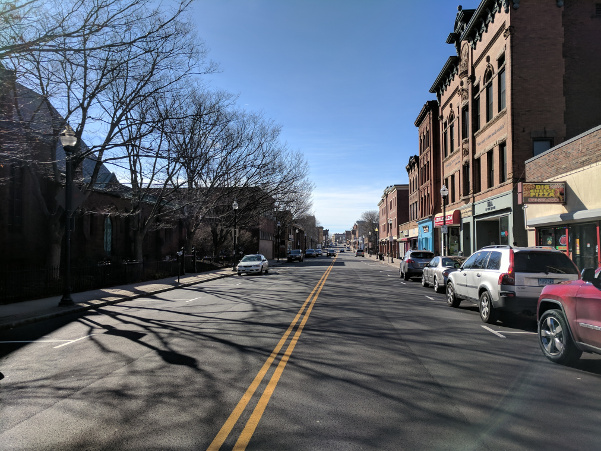
Why Are Two Slates of Good Democrats Asking Me to Choose Between Them?
By Tim O’Brien
On many levels, I am glad that former Mayor, Senator and state Commissioner Don DeFronzo, with support and editing by John McNamara, penned the important history of the 1989 mayoral election. Watershed, serialized in the New Britain Progressive and NB Politicus, tells the story of how a conservative but politically deft political machine, headed by the city’s longest-serving mayor, Bill McNamara, was ousted by a coalition of generally more progressive activists, led by DeFronzo, its candidate for mayor.
There are many takeaways that can clearly be seen in Watershed. One is the similarities between the political machine of Bill McNamara and the current political machine of Tim and Erin Stewart. Another point, the emphasis DeFronzo noted on the volume of voter contact and other work needed to win, makes his work an important read for any true Democrat and progressives, generally.
But one thing about Watershed that I would note is that Democratic primaries in New Britain in those days were stark ideological contests. That had not changed by the time I started getting involved in politics in the 1990s, only a few years after the 1989 Watershed primary. Over the following decade-plus, Democratic Party politics included a number of conservative versus progressive Democratic primaries, separated by short periods of uneasy truce.
There was the battle between state Senator Joe Harper and conservative future state Senator Thomas Bozek. There were the spirited primary campaigns that elected Terry Gerratana and John Geragosian to the legislature. There were primaries over control of the Board of Education. There was DeFronzo’s successful 2002 primary and general election defeat of then, long-serving Senator Bozek. There was the 2003 special election, effectively a Democratic primary, in which Peter Tercyak defeated Mark Bernacki and Louis Salvio for the state legislature. Then there was the final of these contests, the 2004 Democratic Town Committee primary in nearly every voting district of the city, in which progressives soundly defeated the conservatives for the future of the Democratic Party in New Britain.
One of the reasons why the 1989 primary was, indeed, a watershed was that the primaries in the era after that, until 2004, were stark, ideologically-driven contests between good (progressive) and bad (conservative). As political activist, you knew, instantly, which side you were on. They were fights over real substance, in elections that had real consequences in the direction of public policy in the city and state.
If the Democratic Party is to have internal differences that make their way into contested primaries, that is what it should be. The Democratic Party is a “big tent”, with many divergent views, and winning in primaries is a part of moving the Party in the direction you believe in. I support waging primaries when it is about something that matters.
But, when I look at the current contest for control of the New Britain Democratic Party, in Town Committee primaries in Ward 1 and Ward 3, I honestly have no idea what it is really about. I see people who I know, agree with, have supported in the past and personally like, on both sides.
As a quick note, due to a quirk of state law, there is no Row A, so the contest is between Row B and Row C.
The Row B slates say that they have greater experience and are successful in fighting for, and winning on, progressive values. That is all true, and makes them good choices.
But, I do not agree with Row B’s suggestion that the local Democratic Party should not take positions on international issues. The local Democratic Party is the grassroots of the national Democratic Party, and, as such, it very much is its job to be involved in issues at all levels, local, state, national and international.
Row C, which is effectively the challenge slate, says that they are, “pro-democracy advocates and community leaders,” who say that there should be greater emphasis on recruiting new activists into the Party. Among their membership are people who have shown organizing abilities and activism, which makes them good choices.
Row C is also campaigning on diversity of representation, saying that they want the Party to bring in historically marginalized voices. But, Row B says that they are the side supporting diverse representation. Frankly, I do not think either side, taken separately, has done a great job of building the kind of diverse coalition that the Democrats need for the future. A better way to meet the objective in this regard that both sides say they want would have been to iron out their differences and work together.
Row C criticizes the current Democratic Party organization as having a low level of organization and activism. In some respects, this is not fair. I do think that there is an argument that New Britain Democrats are in an organizational upswing, after having won back a majority on the City Council last year and won again in Board of Education elections.
But it is true that the New Britain Democratic Party is still far from being able to organize and campaign as well as it needs to. New Britain Democrats have, for a good long time, now, managed to persuade themselves into a pattern of starting grassroots campaigning only right before elections, late enough that the election is already lost before they begin, and, even then, doing far too little voter contact. This, for example, happened in the 2023 mayoral election. The results speak of themselves, in that New Britain Democrats mainly win in the top election contests only in even-numbered years, when, bluntly, the turnout of Democratic voters is driven by television advertisement campaigns by national and statewide candidates, and not by activism by our local Democratic Party organization.
Again, I refer what DeFronzo says in Watershed. It is not rocket science. Talk to the people and persuade them to vote for what and who you believe in. It takes a lot of time and hard work. Much, much, much more than the Democratic organization in New Britain has allowed itself to believe is necessary. That working harder is needed might be tough to hear, but, if you believe in what you say you believe in, that is what is necessary to win what is good for the people.
But, if Row C feels that all of this supports its case in the Town Committee primary, I would offer a lingering prognostication in my mind. The two slates’ coalitions seem to roughly resemble the 2021 Democratic mayoral primary. Rep. Bobby Sanchez is on Row B for a Ward 3 Town Committee seat, while the Row C team resembles of the coalition of Alicia Hernandez Strong in that 2021 primary. If Row C says it is campaigning as the more highly organized part of the Democratic Party, but is then as solidly defeated by Row B as Strong was by Sanchez in 2021, they will have proven the opposite. Of course, if the comparison to 2021 holds, noting that Sanchez was defeated in the general election by a larger margin than most observers thought was even plausible, a Row B victory in the upcoming Democratic Town Committee primary would mean just as little, in the end, as Sanchez’s defeat of Strong.
In other words, while Row B campaigns on experience and Row C campaigns on activism, there is a good shot that the outcome of the primary will decide little if anything about the Party organization’s ability to win general elections.
By their criticisms of each other, it sounds like both slates see Row C as to the left of Row B. But, in the end, both sides views are, in general, quite progressive. If there is difference between them, I do not see it as large enough to warrant forming separate primary coalitions. It certainly does not come close to the real ideological contests of 1989 to 2004.
It does not even seem like this primary is a contest of which specific individuals, separate from who believes in what, will control the party — something I would consider unworthy. Both slates appear to want to re-nominate the incumbent Democratic elected officials. The sinking feeling that I am struggling very hard against is that the electoral exercise on March 5th may amount only to a clash of personalities. I dearly hope that is not the case, since a baseline of what the Democratic Party’s true believers should be able to expect from their Party’s leadership is for them to work such things out, and get them out of the way, so they can focus on what matters — winning general elections so good things can happen.
So, as a Ward 1 Democrat, with a ballot in the Town Committee primary, the basic question that I have for these two slates of good people is why you are asking me to choose between you?


